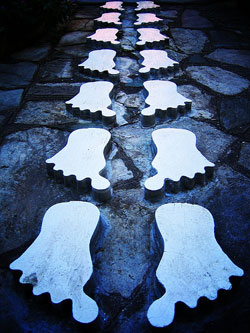Stepping into the Poem

Source: Footsteps, magnuvk, Flickr
Now it’s time to “step into” the poem; in other words, paraphrase each sentence of the poem for its literal meaning. For now, don’t worry about figuring out the poem’s abstract meaning or the poet’s use of poetic devices.Use your notes to write a paraphrase for each sentence. When you have finished each one, check your understanding for a sample response.
- “It is a foolish thing,” said I, “To bear with such, and pass it by; Yet so I do, I know not why!”
- And at each clash I would surmise That if I had acted otherwise I might have saved me many sighs.
- But now the only happiness In looking back that I possess—Whose lack would leave me comfortless—Is to remember I refrained From masteries I might have gained, And for my tolerance was disdained; For see, a tomb.
- And if it were I had bent and broke, I should not dare To linger in the shadows there.
Sample Response:
The speaker says it’s silly to deal with something difficult and then let it go by the wayside. The speaker does not understand why he does this.
CloseSample Response:
Every time there was a conflict, the speaker guesses that if he had done something different from what he had done at the time, he wouldn’t be worrying about it now.
CloseSample Response:
Looking back on the only things that make the speaker happy (but he is comforted by the fact that he has something to be happy about) are the times he stopped himself from showing his superiority. Because of his restraint, he was considered tolerant, and others scorned him for his tolerance. He sees a graveyard.
CloseSample Response:
The speaker concludes that if he had weakened, he would be afraid to wait near the tomb.
Close